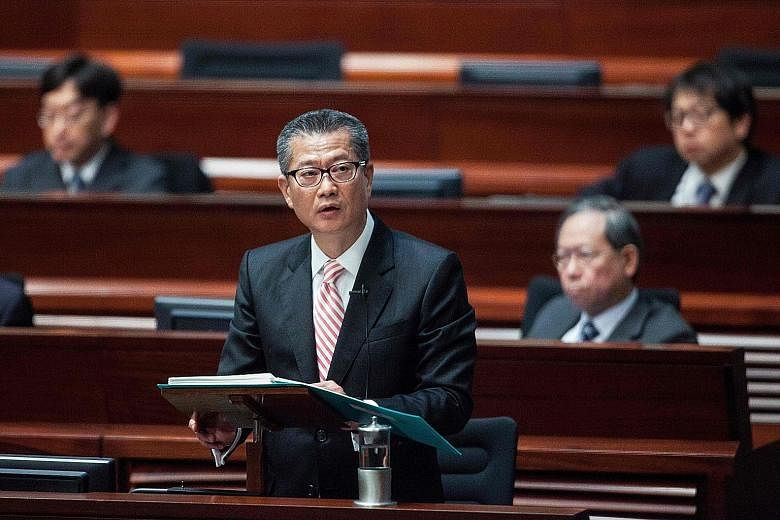Hong Kong's new Financial Secretary Paul Chan yesterday unveiled what was hailed as a "forward-looking" and "populist-leaning" budget, with cuts in income and property taxes.
Mr Chan also said that he will be setting up a tax policy unit to study ways to make Hong Kong more competitive and increase its revenue through taxation. This was in contrast with Mr John Tsang, his longstanding predecessor as finance chief, who had seemed reluctant to change the city's tax regime.
In his budget speech, Mr Chan said there was modest economic growth of 1.9 per cent last year, and predicted a 2 to 3 per cent growth this year.
With a surplus of HK$92.8 billion (S$17 billion), the former development minister announced billions in tax cuts and poverty relief, to improve livelihoods and stimulate the economy.
Mr Chan said the higher-than-expected revenue in land sales and stamp duty had contributed to the record surplus, which is eight times more than the HK$11.1 billion estimated by Mr Tsang last year. Fiscal reserves are expected to reach a record of HK$935.7 billion by end of next month.
Mr Chan, a certified public accountant, said it is on the top of the government's agenda to use the accumulated wealth to take care of the needy, ease the heavy burden of middle class families, and make appropriate investments essential for building a better Hong Kong.
-
BUDGET HIGHLIGHTS
Innovation and technology development
• To reserve HK$10 billion (S$1.8 billion) to support innovation and technology in Hong Kong.
• To explore enhanced tax deductions for innovation and technology expenditure.
Sports development
To allocate HK$20 billion for 26 sports and recreational projects over the next five years in different districts.
Youth and education development
• To deploy HK$1 billion for youth development, including HK$700 million for the Education Bureau to strengthen efforts to promote vocational and professional education and training.
• HK$300 million will also be provided in the financial year 2017 to 2018 for the Home Affairs Bureau to expand its scholarship programme.
Taxation
• To reduce salary tax and tax under personal assessment for financial year 2016 to 2017 by 75 per cent, subject to a ceiling of $20,000.
• To reduce profits tax by 75 per cent, capped at HK$20,000.
Ageing population
To provide extra allowances to social security recipients and those who receive other allowances and subsidies, equal to one month of the standard rate.
Joyce Lim
In a HK$35.1 billion short-term relief package, Mr Chan proposed a 75 per cent reduction in salary tax and tax under personal assessment, subject to a ceiling of HK$20,000, for 2016 to 2017. This will benefit 1.84 million taxpayers and reduce government revenue by HK$16.4 billion. Profit tax for financial year 2016 to 2017 will also be cut by 75 per cent, capped at HK$20,000.
Property tax will be waived by up to HK$1,000 per quarter for the coming year, benefiting some 3.2 million properties and amounting to HK$10.9 billion in lost revenue.
Mr Chan also allocated HK$61 billion from last financial year's surplus for longer-term investments for community benefit, in areas such as social welfare.
Mr Chan's maiden budget speech was delivered amid rising political tensions in the city and the upcoming chief executive election on March 26. While financial experts said the budget was "forward-looking", political analysts said the "populist-leaning" budget was a last-ditch attempt by Mr Chan to improve the image of the current administration under Chief Executive Leung Chun Ying.
"To some extent, it could be called an election budget as it was Paul Chan's best chance to prove himself so that he can remain in the position in the new administration," said political analyst Willy Lam.
The move to set up a tax policy unit was lauded by tax expert Ayesha Macpherson Lau, KPMG China's head of tax Hong Kong, who said she had proposed the unit to the government in a study as early as 2008.
"Tax is becoming more and more important and it is a very powerful tool for the government if it is used properly. The Singapore Government is a role model on how to make use of the tax system to attract investment," she said. "I think they (the Hong Kong government) realise with global competition, they need to use tax to grow and have sustainable development."
Mrs Macpherson Lau also noted how Mr Chan has boldly set a "new direction" for public finance when he cited the principles of finance under the Basic Law. However, she said implementation should not be a "straitjacket" which restrains annual revenue and expenditure but that there should be flexibility.
The total expenditure for financial year 2017 to 2018 is forecast to be HK$491.4 billion, with HK87.5 billion or 17.8 per cent going to education, HK$80.5 billion for social welfare and HK$89.1 billion for infrastructure.


